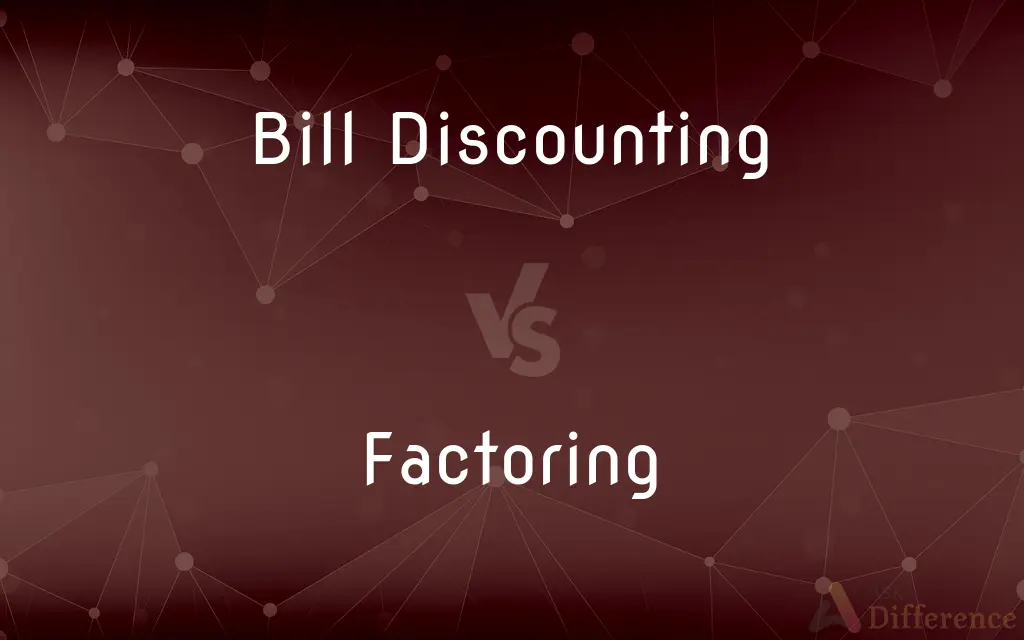Bill Discounting vs. Factoring — What's the Difference?
Edited by Tayyaba Rehman — By Fiza Rafique — Published on December 14, 2023
Bill Discounting involves selling a bill to a discount house before it's due, while Factoring is selling invoices to a third party (factor) to get immediate cash.

Difference Between Bill Discounting and Factoring
Table of Contents
ADVERTISEMENT
Key Differences
Bill Discounting refers to the act of selling a bill to a discount house or financial institution before it matures. This means that businesses can receive money upfront for bills that will only be due in the future. The amount received is slightly less than the bill's face value, accounting for the interest or "discount" that the financial institution charges. Bill Discounting can be a useful tool for businesses needing quick access to cash without waiting for bill maturity.
Factoring, on the other hand, involves selling accounts receivables or invoices to a third party, typically called a "factor." This factor pays the business a percentage of the invoice's value upfront and then collects the full amount from the debtor later. Factoring is more than just a financial transaction, as it often involves the transfer of control and management of receivables to the factor, freeing up the business from the administrative tasks associated with collections.
Both Bill Discounting and Factoring offer ways for businesses to improve their cash flow, but they differ in mechanics and scope. While Bill Discounting strictly deals with the sale of bills to institutions, Factoring involves the sale of invoices and might include additional services, such as handling customer payments and pursuing unpaid invoices.
In choosing between Bill Discounting and Factoring, businesses should consider their specific needs and circumstances. If a company merely wants to accelerate cash inflow from a specific bill, Bill Discounting might be appropriate. However, if a business is looking for broader services, including management of its receivables, Factoring could be more beneficial.
Comparison Chart
Nature
Sale of a bill before its maturity.
Sale of accounts receivables or invoices.
ADVERTISEMENT
Service Provided
Financial transaction only.
Financial transaction plus potential administrative tasks.
Control over Receivables
Remains with the business.
Transferred to the factor.
Type of Debt
Typically bills of exchange.
Invoices or accounts receivables.
Relationship with Debtor
Unchanged, as the debtor pays the business directly.
Factor often deals directly with the debtor.
Compare with Definitions
Bill Discounting
Bill Discounting focuses on bills of exchange.
Bill Discounting helped us turn our bills of exchange into immediate liquidity.
Factoring
Factoring provides immediate liquidity.
By using Factoring, we converted our pending invoices into cash within days.
Bill Discounting
Bill Discounting involves a discount house.
By utilizing Bill Discounting, we sold our bill to the discount house and received immediate cash.
Factoring
Factoring transfers debt risk.
Through Factoring, we transferred the risk of unpaid invoices to the factor.
Bill Discounting
Bill Discounting is selling a bill pre-maturity.
Our company used Bill Discounting to quickly access funds from a bill due next month.
Factoring
Factoring involves selling receivables.
Our company turned to Factoring to sell its outstanding invoices.
Bill Discounting
Bill Discounting incurs a discount or interest.
We received slightly less than the face value due to the Bill Discounting interest.
Factoring
Factoring often includes receivable management.
The Factoring firm took over the task of collecting payments from our customers.
Bill Discounting
Bill Discounting accelerates cash inflow.
To improve our cash flow, we opted for Bill Discounting for our long-term bills.
Factoring
One that actively contributes to an accomplishment, result, or process
"Surprise is the greatest factor in war" (Tom Clancy).
Factoring
One who acts for someone else; an agent.
Factoring
One who purchases accounts receivable at a discount.
Factoring
(Mathematics) One of two or more quantities that divides a given quantity without a remainder. For example, 2 and 3 are factors of 6; a and b are factors of ab.
Factoring
A quantity by which a stated quantity is multiplied or divided, so as to indicate an increase or decrease in a measurement
The rate increased by a factor of ten.
Factoring
A gene. No longer in technical usage.
Factoring
(Physiology) A substance that functions in a specific biochemical reaction or bodily process, such as blood coagulation.
Factoring
To determine or indicate explicitly the factors of
If you factor 70, you get 2, 5, and 7.
Factoring
To engage in purchasing accounts receivable at a discount.
Factoring
A financial transaction whereby a business sells its accounts receivable to a third party (called a factor) at a discount.
Factoring
(math) The process of factorization.
Factoring
Present participle of factor
Factoring
The act of resolving into factors.
Factoring
(mathematics) the resolution of an integer or polynomial into factors such that when multiplied together they give the integer or polynomial
Factoring
Factoring deals with accounts receivables.
Factoring enabled our business to manage its accounts receivables more efficiently.
Common Curiosities
Can Factoring help in receivable management?
Yes, Factoring often includes managing and collecting receivables.
Is Factoring a loan?
No, Factoring is not a loan; it's the sale of invoices for immediate cash.
Do businesses lose control over their bills in Bill Discounting?
No, businesses retain control and responsibility for collection in Bill Discounting.
Is there a cost associated with Bill Discounting?
Yes, the business receives slightly less than the face value of the bill due to the discount or interest.
Do businesses maintain relationships with debtors in Factoring?
In many cases, the factor takes over the relationship, but terms can vary.
How is Factoring different from Bill Discounting?
Factoring involves selling invoices to a third party who manages the receivables, whereas Bill Discounting is selling a bill before its due date.
Does the factor own the invoices in Factoring?
Yes, in Factoring, the factor buys and owns the invoices.
Who assumes the risk of non-payment in Factoring?
The factor typically assumes the risk of non-payment.
What is Bill Discounting?
It's the selling of a bill to a discount house before it matures to receive cash quickly.
Which provides quicker cash: Bill Discounting or Factoring?
Both provide immediate liquidity, but the speed can vary based on specific terms and conditions.
What type of documents are used in Bill Discounting?
Typically bills of exchange.
Why might a company choose Bill Discounting?
A company might use Bill Discounting to quickly access funds from a specific bill due in the future.
Is Bill Discounting a common practice?
Yes, many businesses use Bill Discounting as a financial tool to improve cash flow.
Can any business use Factoring?
While many businesses can use Factoring, it's especially common for those with significant accounts receivables.
Which is more suitable for small businesses: Bill Discounting or Factoring?
It depends on the business's needs. If they want to manage their own bills, Bill Discounting might be better. If they need broader services, Factoring might be more appropriate.
Share Your Discovery

Previous Comparison
Full-Service Broker vs. Discount Broker
Next Comparison
Forensic Science vs. CriminologyAuthor Spotlight
Written by
Fiza RafiqueFiza Rafique is a skilled content writer at AskDifference.com, where she meticulously refines and enhances written pieces. Drawing from her vast editorial expertise, Fiza ensures clarity, accuracy, and precision in every article. Passionate about language, she continually seeks to elevate the quality of content for readers worldwide.
Edited by
Tayyaba RehmanTayyaba Rehman is a distinguished writer, currently serving as a primary contributor to askdifference.com. As a researcher in semantics and etymology, Tayyaba's passion for the complexity of languages and their distinctions has found a perfect home on the platform. Tayyaba delves into the intricacies of language, distinguishing between commonly confused words and phrases, thereby providing clarity for readers worldwide.
















































